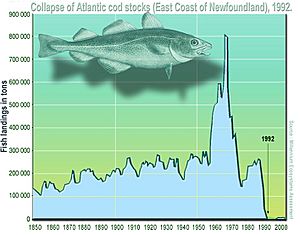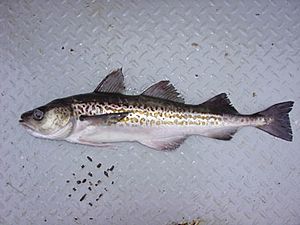Overfishing facts for kids


Overfishing happens when people catch too many fish. It's a kind of over-harvesting where there aren't enough fish left in the sea. This means that what seems good for a short time (catching lots of fish) isn't good for the future. Also, what helps some fishermen right now might hurt all of them later on. This idea is sometimes called the "tragedy of the commons".
Contents
What is Overfishing?
When too many fish are caught, there aren't enough adult fish left to lay eggs and make more fish. For example, with cod, the biggest female fish lay the most eggs. But these large females are often caught, so the average size of the fish that can have babies gets smaller. This means fewer eggs are laid, and fewer new fish are born. Over time, catching the biggest fish has made the adult females smaller.
Why is Overfishing a Problem?
Overfishing can cause fish populations to shrink dramatically. If there aren't enough fish, it can affect the whole ocean food web. Other animals that eat these fish might struggle to find food. It also means less fish for people to eat in the future. This can hurt the jobs of fishermen and the economies of countries that rely on fishing.
Famous Examples of Overfishing
A well-known example is the cod in the Northwest Atlantic Ocean. People caught so many cod in the United States and Canada during the 1970s and 1980s that the fish numbers crashed in the early 1990s. This caused a big problem for the fishing industry there.
What Can We Do?
As consumers, we can learn about the fish we buy. Many organizations provide information on which seafood is caught in a way that doesn't harm fish populations. By choosing fish that are caught sustainably, we can help protect ocean life.
Images for kids
-
Jack mackerel caught by a Chilean purse seiner.
-
Overfishing can hurt coral reefs and the fish that live there. Fish from reefs are a main food source for over a billion people.
-
The Chinese paddlefish, which used to live in the Yangtze River, is now extinct because of overfishing and dams.
See also
 In Spanish: Sobrepesca para niños
In Spanish: Sobrepesca para niños
 | Roy Wilkins |
 | John Lewis |
 | Linda Carol Brown |







